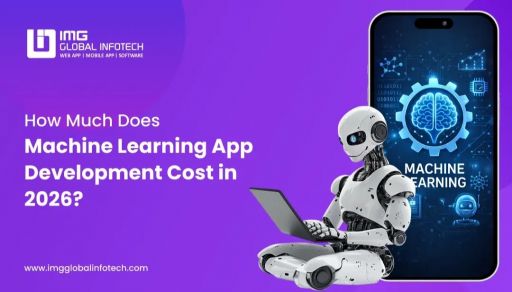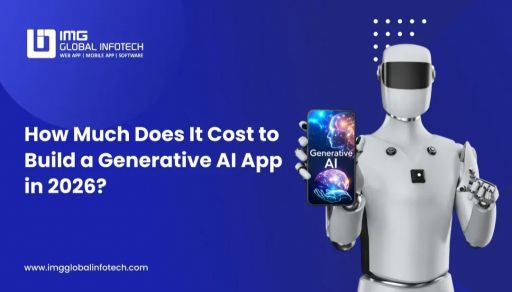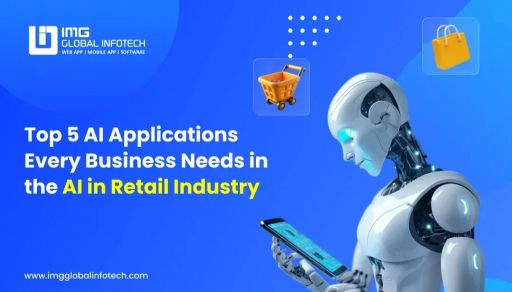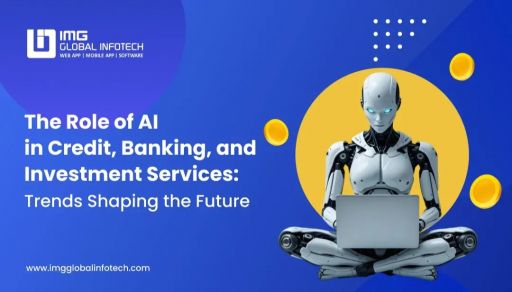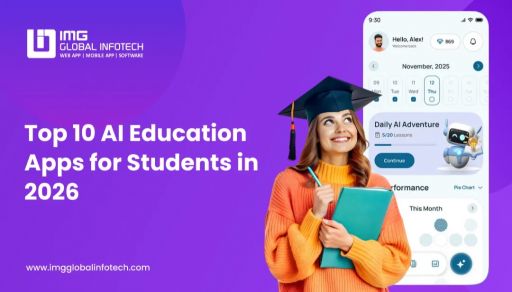AI Shopping App Development: Complete Guide 2026
Lokesh Saini
May 14, 2025

Is there a shift happening in the world of eCommerce, which is largely driven by the development of Artificial Intelligence (AI) technology? With the projected potential of surpassing $15 billion by the year 2026, In Artificial Intelligence market opportunities alone practically guarantee that the global AI market is bound for success. Moreover, entrepreneurs interested in AI shopping apps have commended their potential for seamless personalization, streamlined business processes, and heightened engagement. Think of programs that provide almost instant recommendations for products, extract images for shopping catalogs, and offer intelligent customer service via chatbots. Here, we will discuss the particularities of AI shopping app development, allowing you to take advantage of this opportunity and develop new retail experiences. So, are you ready? Let's get his blog started.
Market Statistics of Online Shopping Apps
The proportion of eCommerce sales that originate from mobile devices has skyrocketed to over 70%, and this is directly attributed to the availability of online shopping applications.
As of now, the global mobile commerce market is forecasted to achieve $4.5 trillion by 2026.
Some of the most frequently downloaded shopping applications worldwide include Amazon, Flipkart, and Shein.
Users of popular ecommerce apps like ozsale dedicate on average 10-15 minutes, per session, on these platforms.
Due to the improved experience and faster checkout times offered through mobile applications, 80% of shoppers prefer using apps over websites.
During the past 2 years, shopping application downloads have increased by 25%, with a notable rise from Tier 2 and Tier 3 cities.
AI-driven recommendations and user personalization have boosted in-app conversions by 30%.
Users tend to uninstall ecommerce apps if the performance and overall user experience are lacking—approximately 40% within the first 30 days.
The in-application offering of same-day or next-day delivery significantly increases the repeat purchase rate by over 60%.
Asia-Pacific leads global mobile e-commerce app usage, accounting for over 50 percent of total active users.
Key Features of an eCommerce Shopping App
To invest in AI shopping app development, you must know about its incredible features, which will make it powerful in 2026.
Intuitive Product Browsing:
Smooth product navigation is achieved through the use of defined categories, comprehensive filtering by price, size, or color, and sorting options that assist shoppers in quickly locating desired items.
High-Quality Product Listings:
Items should be presented with multiple high-resolution images, vivid descriptions, variations such as size and color, as well as reviews from other customers to enable informed purchase decisions with apps like Temu.
Seamless Search Functionality:
A search bar should have predictive and typo-tolerant features so that users can use keyword, category, or voice commands to describe specific products.
Personalized Recommendations:
Relevant products should be suggested based on the user's browsing history, purchase history, and saved items using advanced algorithms to enhance product discovery and, consequently, sales.
Convenient Shopping Cart:
Users should be able to add, view, and edit items in the cart with easy access to a visible subtotal, shipping costs, as well as undiscounted or promo code options.
Secure and Diverse Payment Gateways:
With ecommerce fashion apps like zara Ensure secure transactions by offering multiple trusted options for payments such as credit or debit cards, digital wallets, or UPI catering to varying user preferences.
Streamlined Checkout Process:
Optimize the mobile checkout flow by streamlining the steps to increase conversion rates while reducing friction and cart abandonment.
Real-Time Order Tracking:
With the help of an e-commerce shopping app, Up-to-date order and shipping notifications with estimated delivery timelines keep users informed while fostering trust.
Wishlist and Favorite Items:
Allow users to track wanted items by saving them for future purchases, tracking potential acquisitions, and fostering engagement with fashion e-commerce app development.
Push Notifications and Alerts:
Timely updates concerning order status, new arrivals, and personalized special offer recommendations re-engage users and drive repeat purchases.
Customer Support Integration:
Proactively accessed customer service via in-app chat, FAQs, or contact forms improves assistance response times and fosters an overall better shopping experience.
User Account Management:
Enable personalized customer engagement by allowing users to create profiles, edit preferences, save addresses, and view their order history with an e-commerce shopping app.
Advantages of AI in Shopping App Development
Here are five key advantages of integrating AI into shopping app development:
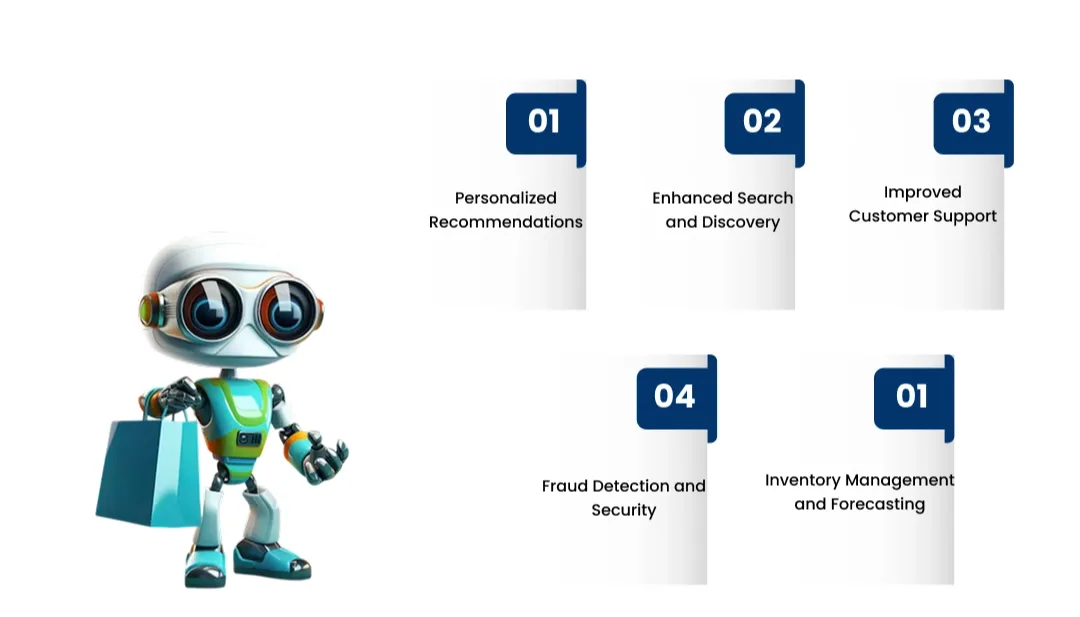
Personalized Recommendations:
AI algorithms assess user preferences, history and behavior to provide tailored recommendations of products which boosts user engagement, conversion rates, and overall experience.
Enhanced Search and Discovery:
Machine learning algorithms undergo constant refinement of AI-driven search capabilities. Users can search using phrases that a machine can recognize and interpret, with natural language processing (NLP). Moreover, products can be located through their images, which is made possible by visual search technology.
Improved Customer Support:
Responding to customer queries through AI chatbots provides instant answers and 24/7 support, eliminating the need for human input for routine issues. Customer satisfaction improves while response times decrease, aiding human agents with more complex inquiries.
Fraud Detection and Security:
Examining transaction patterns and user behavior through AI algorithms helps identify and prevent fraudulent activities. This reinforces business and customer trust and enables a secure shopping experience.
Inventory Management and Forecasting:
AI uses sales data, seasonal trends, and other aspects to forecast inventory, providing accurate predictions. This data helps businesses optimize stock levels, ultimately reducing waste from overstocking and stockout situations, resulting in improved efficiency and cost savings.
Challenges in Implementing AI in Shopping App Development
Here are a few important challenges that you may face during the process to create e-commerce apps with AI.
Data Scarcity and Quality:
Training effective AI models entails personalizing recommendations and visual search, which involves immense amounts of user data. Amassing and maintaining such datasets while respecting user privacy can present a significant challenge, especially for newer applications or niche markets.
Integration Complexity:
Integrating AI capabilities into pre-existing online shopping apps frameworks incurs great technical difficulty. Ensuring the various operating systems, device capabilities, and pre-existing attributes are seamlessly integrated requires extensive planning, engineering, and robust construction which may inflate development expenditures and timelines.
Maintaining Accuracy and Trust:
Nobody's perfect, not even AI. Frustrated users and declining trust in the app could stem from inaccurate product suggestions, broken visual searches, or chatbots that just don't get it right. The ongoing maintenance of AI models is core to their performance, but it is also a testing and monitoring burden that demands high resource availability.
Cost of Development and Maintenance:
Allocating resources towards advanced AI technologies will result in an increased financial output. Advanced engineering will demand the attention of a machine learning engineer, data scientists, and AI experts, further adding to the resource burden. Even more, model updates, maintenance, and structural improvements will drive the costs even higher.
User Adoption and Perception:
For users, the integration of AI could cause privacy issues or pose a concern if they don't understand the particular functions these AI features serve. Effectively addressing skepticism alongside clear value communication would help shift perception but warrants losing automatic adoption.
AI Shopping App Development: Step-by-Step Process
Here is the step-by-step guide to a shopping app development with experts' help.
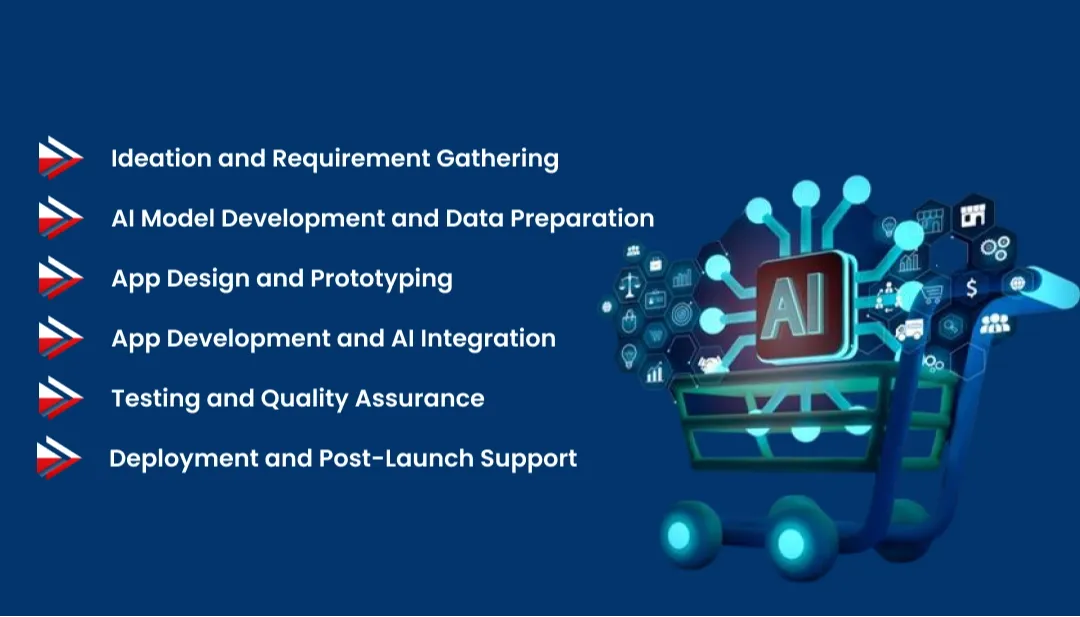
Stage 1: Ideation and Requirement Gathering:
Identifying your app's unique proposition, ideal user profile, and targeted AI technologies is the goal of this phase. Key functionalities spanning from personalized suggestions, chatbots, and predictive analytics to advanced AI features like visual search will be designed during brainstorming sessions with an AI Development Company. Listing and documenting all functional and non-functional requirements, such as UI/UX stipulations and platform preferences (iOS/Android), is critical to defining the scope. All this information will serve as the starting point for the entire document.
Stage 2: AI Model Development and Data Preparation:
Selecting the best company out of the e-commerce app development companies will emphasize building and selecting all the appropriate models of AI and ML with examined features. This includes data set as well as data set collection, cleaning, labeling, and possibly even preprocessing. They shall adopt appropriate algorithms, such as image recognition, deep learning and collaborative filtering, and proceed to model training. Privacy and data security concerns are of the uppermost importance during this phase.
Stage 3: App Design and Prototyping:
Simultaneously, UI and UX designers shall be busy with wireframes and prototypes, concentrating on easy UI navigation and user flows. Integrating features powered by AI into the app's design will be the responsibility of the AI development firm. At this juncture, feedback on the prototypes is strongly encouraged to improve the design prior to starting on building the actual app.
Stage 4: App Development and AI Integration:
In this most advanced phase, AI-app bots are designed to incorporate AI into everything for etaxi-type applications. At this point all aspects of the online shopping app development user interface are designed as is the server logic working together in unison as well as all communications with the database. Together with data stream control, networking tests, and performance verification, the shot is run in simulation. Throughout this period we'll continue a series of tests on AI responsiveness and behavior to refine precise voice command execution and optimize multi-command processing.
Stage 5: Testing and Quality Assurance:
Identifying and fixing bugs, validating AI features, and ensuring optimal performance requires comprehensive testing. This includes unit tests, integration tests, user acceptance tests (UAT), and targeted AI functionality tests such as recommendation accuracy and chatbot responsiveness. The AI development company is going to use many different testing strategies to ensure the quality of their work.
Stage 6: Deployment and Post-Launch Support:
Once the application has successfully completed all testing phases, it is released to the respective app stores (Apple App Store and Google Play Store). Usually, the AI development company offers some post-launch assistance which includes bug elimination, making improvements, retraining the AI models with real-world data, and providing routine upkeep to keep the application functioning optimally and relevant constantly. Collecting feedback from users post-launch is important to advance further.
Future of Shopping: AI-Driven Retail Media Trends Forecast for 2026
Now that you know how to build a custom e-commerce app, here are the key AI-driven retail media trends expected to shape the future of shopping in 2026:
Hyper-Personalized Consumer Experiences: With the help of the latest e-commerce trend, retailers will be able to delve into enormous datasets analyzing customer behavior, preferences, and purchase history to provide tailored product suggestions, offers, and content everywhere. This shifts the baseline personalization 'hyper-personalization' approaches to a new level, micro-targeting them with incredible accuracy.
Enhanced Visual Search and Discovery: Users will be able to find products almost instantly by uploading photos, which will allow AI-driven visual search to be a standard feature in shopping applications. This will facilitate the discovery of products and increase conversion, especially in visually driven categories such as apparel and home furnishings.
Predictive Analytics for Inventory Management: AI will accurately predict how much of a certain product will be needed and eliminate overstocking and stockouts during demand planning, proactively revolutionizing inventory management. This also includes dynamic fulfillment, where AIs can change the placement of inventory in real-time to ensure predicted demand, greatly enhancing customer satisfaction.
AI-powered Sustainability Metrics: shopping app development solutions with AI will add value by monitoring or informing customers about retailers' eco-friendly practices, which include tracking the emissions of product's carbon footprint, streamlining logistics given emissions reduction, and pointing out greener alternatives to shoppers to affect their choices and brand loyalty.
Augmented Reality (AR) and Virtual Reality (VR) Shopping Experiences: Customers will be able to use AI to augment their shopping preferences with immersive interactions. These AI applications will allow customers to browse products, "try them on," and even assemble the product directly from their homes, making it a smoother experience than visiting physical shops.
Cost to AI Shopping App Development
The AI shopping app development cost goes from 15,000 to 49,000 USD, while more sophisticated applications often breach the 49,000+ mark and can even tip over into the million-dollar territory. This high-level figure is impacted immensely by these eight outlined factors that we will delve into:
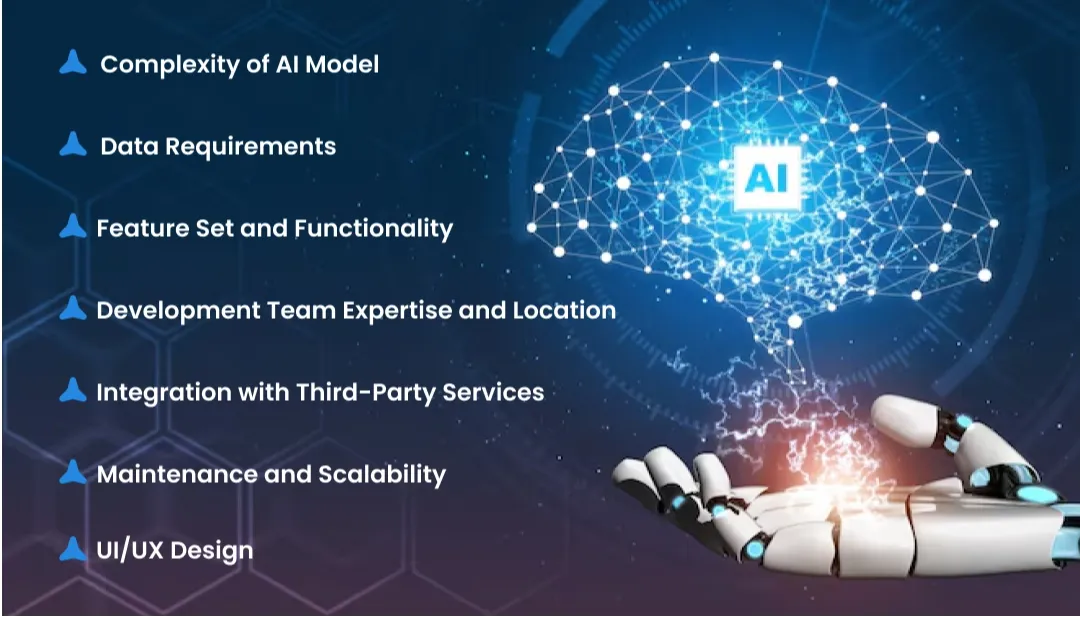
Complexity of AI Model:
The cost of AI shopping app development related to the implementation of AI components of the program also varies. The implementation of simple AI components such as basic text-based AI assistants and item suggesters is cheaper. In contrast, implementing more complex features, such as advanced natural language processing, pattern recognition, and deep learning algorithms, requires additional funding and other resources and increases expenses significantly.
Data Requirements:
Training AI models requires high-quality labeled data at scale. Assembling specialized or proprietary data can lead to expensive data collection, cleaning, and preparation. Data maintenance and regular updates also increases the ongoing ai shopping app development cost.
Feature Set and Functionality
As with any project, the number and complexity of features directly influence the amount of time and effort required. The AI shopping app development cost to implement basic features such as user login and product browsing would be far less than incorporating complex features such as personalized recommendations, visual searches and AR/VR try-ons, or the integration of AI chatbots.
Platform Compatibility:
Creating a native application for a single platform, whether it be iOS or Android, is significantly more cost-effective than multi-platform or cross-platform solutions. The need for adaptive responses to various devices and operating system versions escalates complexity alongside ai shopping app development cost.
Development Team Expertise and Location:
The cost to hire remote developers and size, skill set, geographic location also matter significantly. AI developers and data scientists with advanced experience have high market value. Outsourcing to low-cost regions is effective but requires additional care for communication, quality assurance, and control.
Integration with Third-Party Services:
Beyond the payment gateways, social media accounts, mapping services, and other externally integrated APIs can increase complexity as well as add extra costs for licensing and seamless integration.
Maintenance and Scalability:
Feedback from multiple app users and expenditures related to maintenance, problem-solving, feature enhancement, and AI model updates in real-time requires attention. In a user scenario, it needs flexible, innovative architecture, which has severe consequences on primary AI shopping app development costs.
UI/UX Design:
Engaging user interfaces are visually appealing and highly intuitive but require intricate designs with animations and seamless navigation that increase overall expenses. In contrast, template-driven designs offer advanced UI at significantly lower cost of ecommerce development.
Final Words
As we finish this goes deep into a guide covering the specifics on AI shopping app development in the year 2026. We highlight how the role of AI in developing tailored and user friendly ecommerce experiences, is transforming everything. The intersections of AI implementation including the handling of information, data trust, and security, require professional guidance on strategy.
Consider IMG Global Infotech your partner as they explore this path. We have a deep grasp of cutting-edge tech and mobile app development, focusing on building robust and scalable products, so we will help you design a personalized mobile shopping app based on the business requirements you have shared. From integrating tailored recommendation systems and smart search features to AI chatbots and visual search, our ecommerce website development services will walk you through the launching into action in 2026 and stimulate lucrative futuristic e-commerce prospects for the entire world.
-
 How to Build a Jewelry E-commerce Website Like CaratLane?
How to Build a Jewelry E-commerce Website Like CaratLane?
-
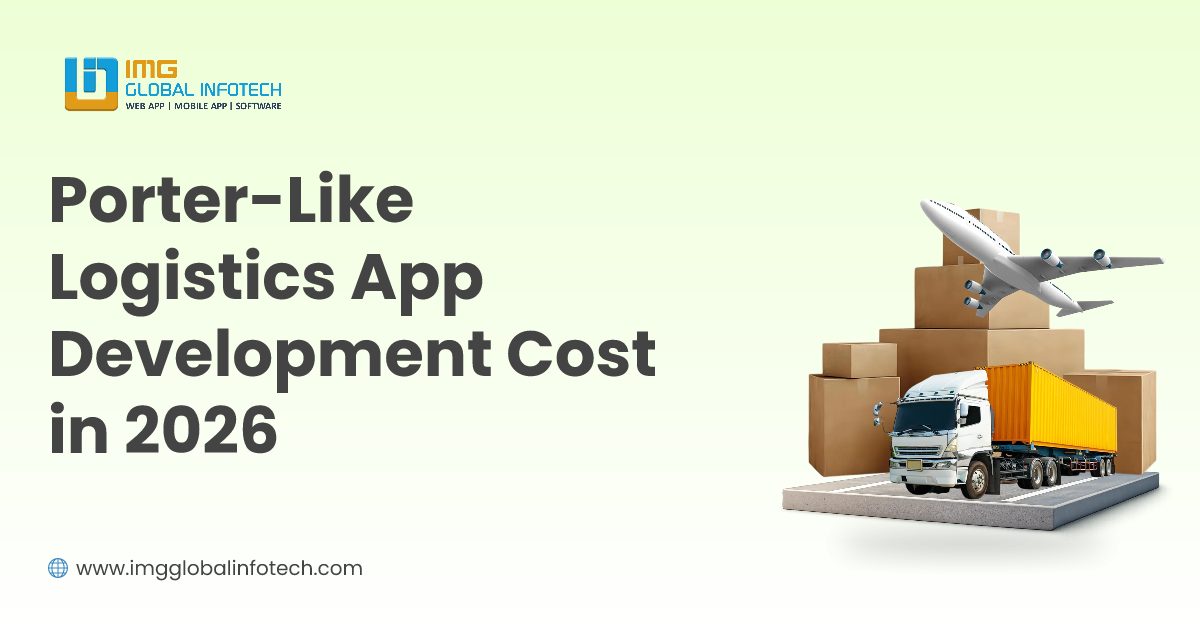 Porter-Like Logistics App Development Cost in 2026
Porter-Like Logistics App Development Cost in 2026
-
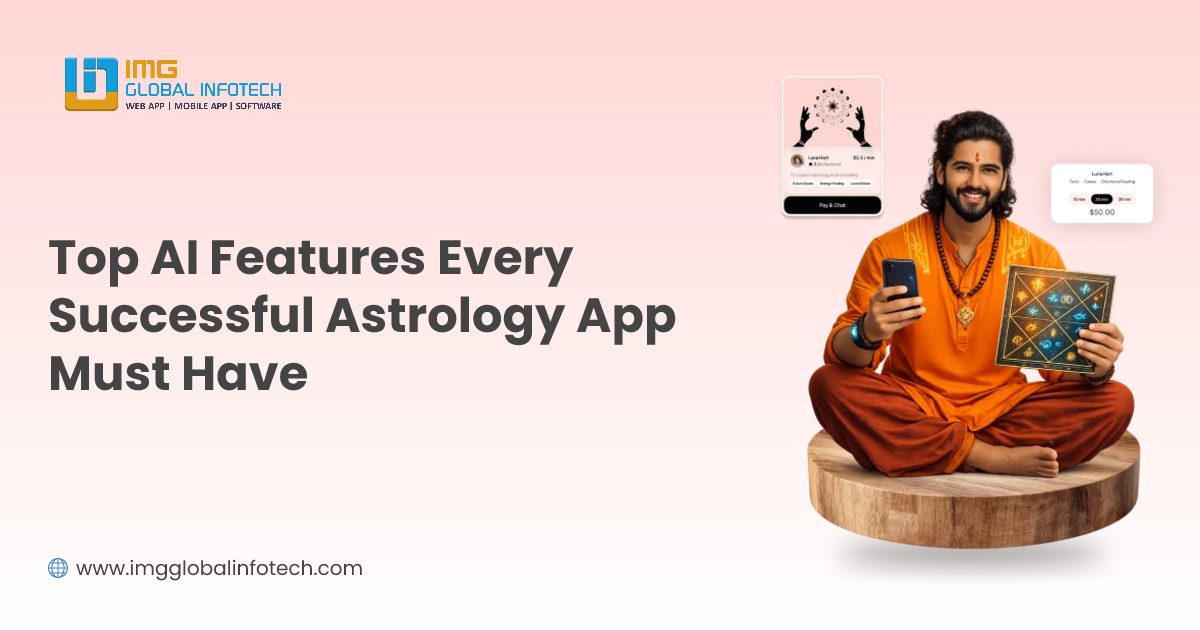 Top AI Features Every Successful Astrology App Must Have
Top AI Features Every Successful Astrology App Must Have
-
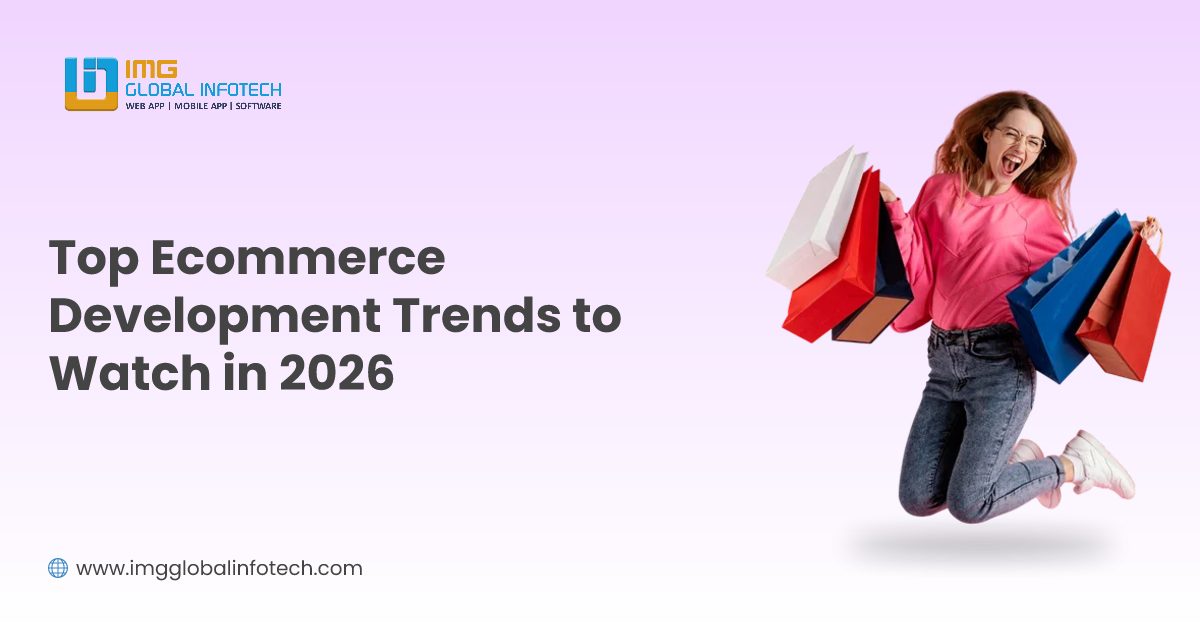 What Are the Top Ecommerce Development Trends to Watch in 2026?
What Are the Top Ecommerce Development Trends to Watch in 2026?
-
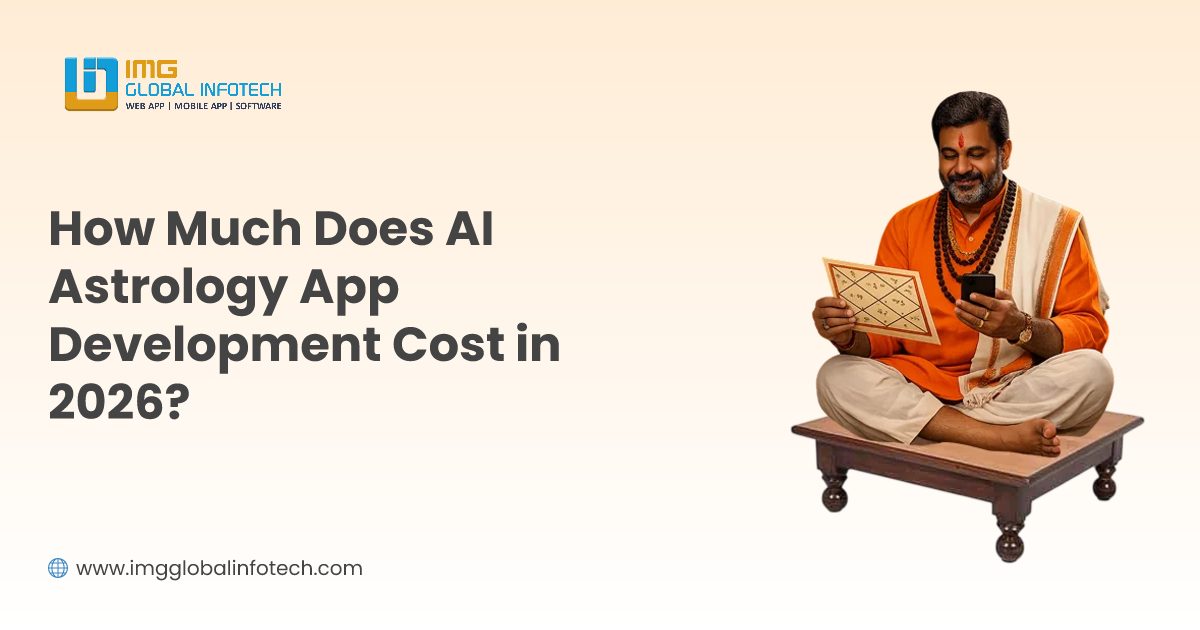 How Much Does AI Astrology App Development Cost in 2026?
How Much Does AI Astrology App Development Cost in 2026?
-
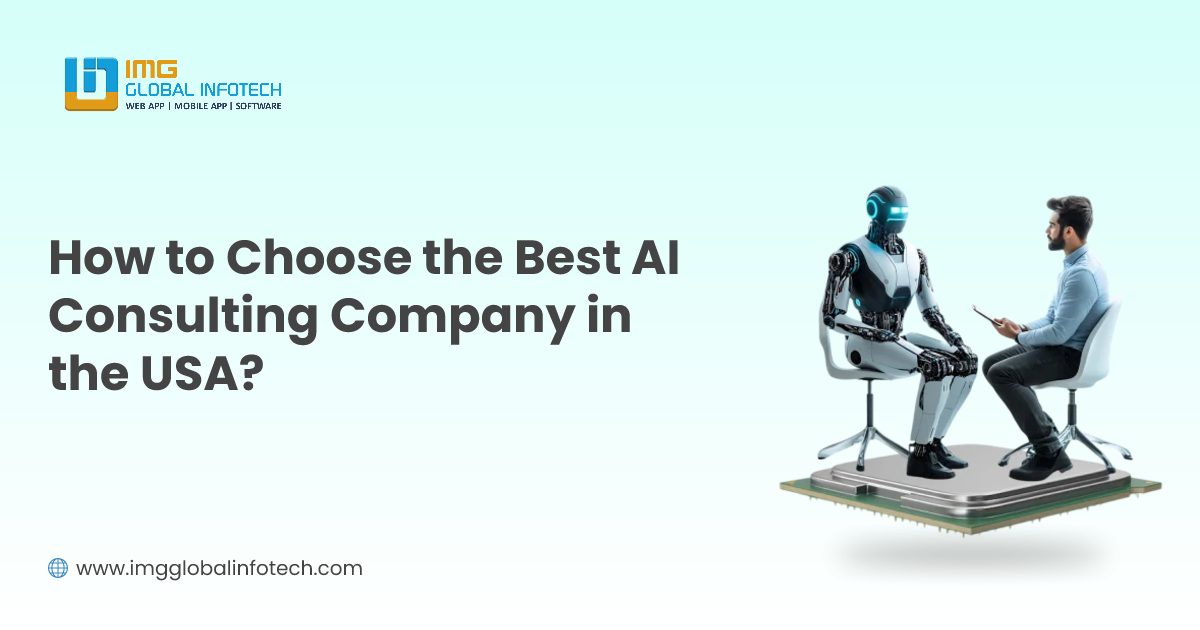 How to Choose the Right AI Consulting Company in the USA?
How to Choose the Right AI Consulting Company in the USA?
Lokesh Kumar is the Digital Marketing Manager & SEO Content Strategist at IMG Global Infotech, a top-rated Web & Mobile App Development Company. With extensive experience in digital marketing, SEO, and content strategy, he specializes in boosting online visibility and driving organic growth for startups, SMEs, and global brands. Lokesh is passionate about creating SEO-friendly, user-centric content that not only ranks but also converts. His deep understanding of digital trends and search algorithms helps businesses thrive in a competitive online space.


